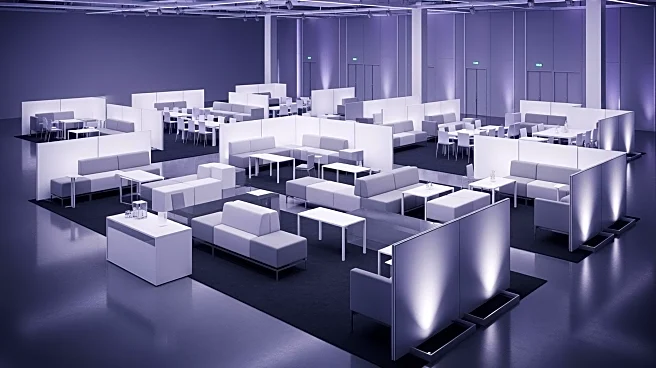What's Happening?
In 2025, event venues across global markets have undergone significant transformations, adopting new operational norms that prioritize elasticity and adaptability. This shift marks a departure from temporary adaptations seen in previous years, as venues now embrace long-term strategies to manage operations and attract business. Key changes include a move towards experience-led venues, with planners increasingly considering alternative spaces such as stadiums and vineyards. The importance of food and beverage has also risen, with planners rating it at 9.0/10 in importance, reflecting a trend towards cultural expression and sustainability. Additionally, venues are adapting to short lead times and unpredictable RSVPs, requiring continuous, adaptive
decision-making supported by real-time visibility and cross-department coordination. Workforce strategies have matured, focusing on staff engagement, mental load management, and continuous training, as highlighted by the Moore Kingston Smith Hospitality report.
Why It's Important?
The transformation of event venues in 2025 is crucial for the hospitality industry, as it signals a shift towards resilience and strategic clarity in the face of ongoing volatility. By adopting elastic operations, venues can reduce operational stress and enhance their ability to respond to dynamic market conditions. This evolution is significant for U.S. venues, as it aligns with broader industry trends towards experiential and immersive event experiences. The increased focus on food and beverage as a core brand and attendee experience driver highlights the growing importance of cultural and sustainable practices in event planning. Furthermore, the maturation of workforce strategies addresses persistent labor shortages and budget constraints, ensuring that venues can maintain high levels of service and employee satisfaction. These changes position venues to better navigate uncertain cycles and stabilize revenue, ultimately benefiting the broader hospitality sector.
What's Next?
As venues continue to adapt to the new operating era, several questions will shape their operations in the coming year. These include designing venues to support dynamic event formats, evolving food and beverage offerings as core experience drivers, and ensuring operational teams remain healthy and motivated under pressure. Automation and real-time insights are expected to play a significant role in helping venues stabilize revenue and enhance strategic clarity. Venues that successfully build flexible processes and empower their teams will enter 2026 with a competitive advantage, having embraced resilience as a key component of their operational strategy.
Beyond the Headlines
The shift towards elastic operations in event venues reflects broader cultural and psychological changes within the industry. By moving away from the notion of returning to normal, venues are embracing a mindset that prioritizes creativity, compassion, and culture as strategic necessities for growth. This approach not only enhances operational efficiency but also fosters a more inclusive and engaging event experience for attendees. The focus on sustainability and cultural expression in food and beverage offerings further underscores the industry's commitment to aligning with evolving consumer expectations and values. As venues continue to innovate and adapt, they are likely to influence broader trends in hospitality and event planning, setting new standards for resilience and adaptability.

















